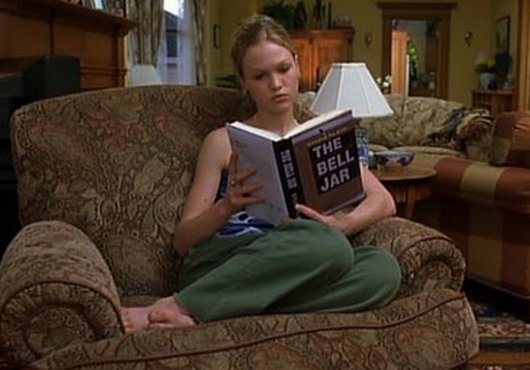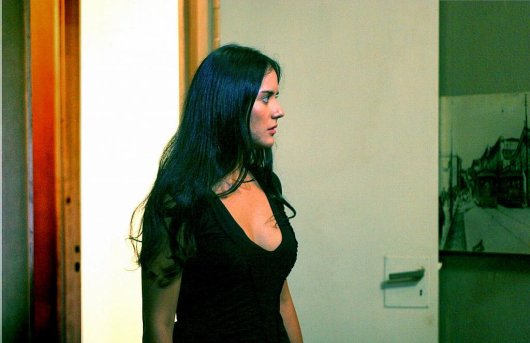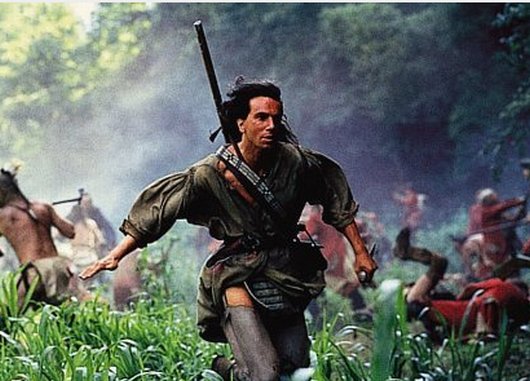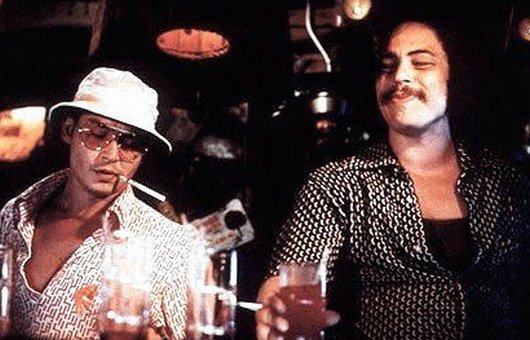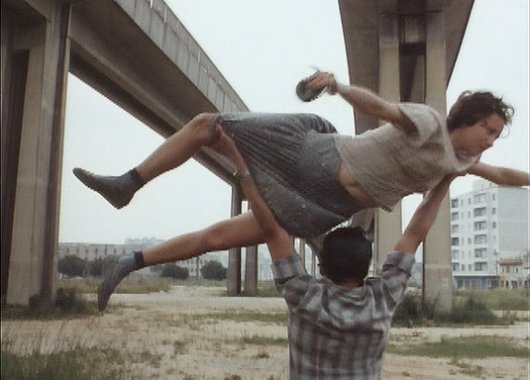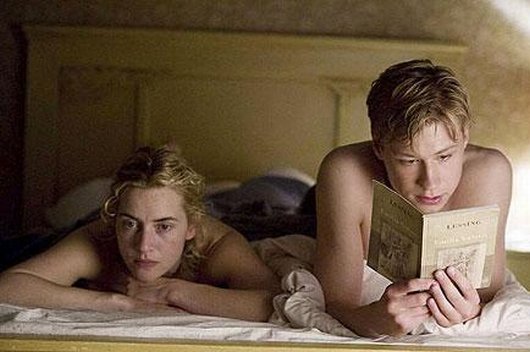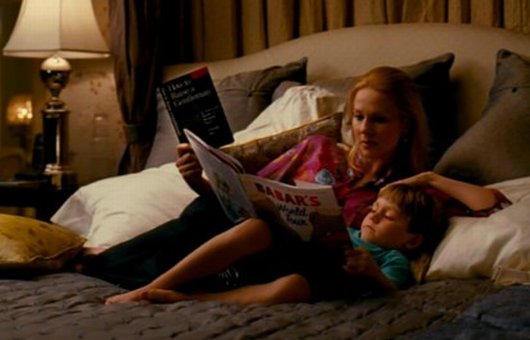 FILM
FILM In Which Sex Is Something That Lacks Precision
 Wednesday, April 4, 2012 at 9:56AM
Wednesday, April 4, 2012 at 9:56AM 
25 Verifiable Facts About Marlon Brando
by ELLEN COPPERFIELD
1
When I first saw Marlon Brando, he looked like a bowling ball with a lisp emitting from the finger holes.
2
He was a hellion as a teen. His parents sent him to the same military academy his father had attended. He wrote, "I'm kinda homesick and want my mother, but I guess I will get over that. I've received exactly one letter since I've been here. Fine support for the baby of the family." The next month he added, "I had to read Wuthering Heights for English and I never enjoyed a book in all my life as much as that one."
3
He fled the set of Darryl Zanuck's The Egyptian, dressing up in the most expensive clothes he could find because they were looking for the Marlon who always wore a t-shirt and jeans.
4
While filming Mutiny on the Bounty, Marlon spied a Tahitian island and purchased it from the blind elderly American woman who lived there with forty cats and dogs. She had to go to Vallejo, CA for medical treatment. He bought the place for $200,000. Shortly after she moved she died.

5
A Harvard Medical School psychologist who slept with Marlon observed, "There are casual ladykillers and serious ladykillers. The casual ladykiller is a person who doesn't try to involve you in a relationship but seeks to get you only by the magnetism of his sexuality. A serious ladykiller has much more imagination and tries to capture you in more intricate ways - meaning that he involves you with his ideas, his thinking. The seduction is much more complicated - only then he has more trouble because women inevitably fall in love with him."
6
When he was trying to get his break in the theater, he was offered a part in a new play by Eugene O'Neill, The Iceman Cometh. Marlon later wrote, "I'd always thought he was dour, negative and too dark." He argued with a producer about "why I thought the play was ineptly written, poorly constructed, and would never be a success."
7
After he filmed the movie version of A Streetcar Named Desire Marlon moved into an apartment near Carnegie Hall and seduced the entire group of young actresses at the Actor's Studio. He met Marilyn Monroe when he elbowed her in the face by accident. She replied, "There are no accidents." She invited him over for sex the week before she died. In his autobiography Songs My Mother Taught Me he wrote, "I didn't sense any depression or clue of impending self-destruction during her call. That's why I'm sure she didn't commit suicide. If someone is terminally depressed, no matter how clever they may be, or how expertly they try to conceal it, they will always give themselves away. I've always had an unquenchable curiosity about people, and I believe I would have sensed something was wrong if thoughts of suicide were anywhere near the surface of Marilyn's mind. I have always believed she was murdered."
8
Jean Cocteau said of him, "Marlon is the only man who can make noise without disturbing anybody."

9
Marlon hated having sex with a condom on. He regarded it as base.
10
After meeting Marlon before they began shooting Last Tango in Paris, Bertolucci said, "In Bacon you see people virtually throwing up their guts and doing a monkey's job on themselves with their own vomit. I found this same kind of appeal in Marlon."
11
He would always willingly supply the money for an abortion.
12
When The Godfather came around, Marlon was desperate for a role to revive his career. Francis Ford Coppola could not possibly ask him to audition, so he asked Marlon if he could come by the actor's Mulholland Drive home and "improvise" in front of a camera. After he saw the tape, producer Bob Evans said, "He looks Italian, fine. But who is he?" He did not recognize the man before him.
13
Marlon's mother was a furtive alcoholic. She would take quiet sips from a small bottle whenever she could. "When my mother drank," Marlon said, "her breath had a sweetness to it I lack the vocabulary to describe."

14
In the wake of Dr. King's death, Marlon felt an affinity for the Black Panthers. They did not share this positive feeling. "They told me that they despised me because I was just another knee jerk white liberal to them."
15
The day before A Streetcar Named Desire opened at the Ethel Barrymore, Marlon telegrammed his father to say, NEED MONEY BY TONIGHT SHOW SPLENDID LETTER TO FOLLOW MARLON.
16
He believed that by dripping a wet towel soaked with hot water on his head, he would never go bald.
17
On the set of A Countess From Hong Kong, during a close-up, he asked Sophia Loren if she knew small hairs were coming out of her nose. She never spoke to him again.

18
After watching his performance in The Godfather, he said, "When I saw it the first time it made me sick. All I could see were my mistakes and I hated it."
19
If he liked you, he wanted to be close to you, even if just briefly. "Like a large number of men," he eventually admitted, "I too have had homosexual experiences and am not ashamed. I've never paid attention to what people said about me. Deep down I felt ambiguous and I'm not saying that to spite the seven out of ten women who consider me - wrongly perhaps - a sex symbol. According to me, sex is something that lacks precision. Let's say sex is sexless."
20
When Lew Wasserman tried to change the title of The Appaloosa to Southwest to Sonora, Marlon did not take it very well. He hired a group of mariachi players to go around Universal singing a song they had written called "Southwest to Sonora" until the studio aceded to his wishes.
21
In later years, Brando became very uptight about his weight. He would pull up the curtain whenever he changed clothes.

22
Marlon's son Christian spiralled out of control with drugs and alcohol as a teen. He would steal pot from neighbor Jack Nicholson's stash. If Jack caught him, Christian Brando would imitate his part in Chinatown, saying "You do that again and I'll break your fucking fingers, man."
23
On the set of Guys and Dolls, Sinatra and Brando just did not get along. One man never blew a line, the other wrote his dialogue on his hand. Frank's thugs followed him everywhere; Marlon was most happy completely alone. The only way they could get Marlon to go through with it was to buy him a white Thunderbird convertible.
24
On the set of The Fugitive Kind, Tennessee Williams screamed at Marlon, "I need radar equipment to hear what you're saying. If I can't hear my fucking dialogue, I'm going home."
25
As he traveled through France, he once spent the night with a woman in Ascain. "It's a terrible story," he told his friends, murmuring, "awful, awful, awful." They asked what happened, and he said, "I had a very nice time with her, and she made me a wonderful breakfast. I was thinking, 'Thank God she hasn't asked me for anything', but then when I was leaving, she did just that. She said, 'When shall we meet again?' It's too awful. That's what I had been afraid of all along."
Ellen Copperfield is the senior contributor to This Recording. She is a writer living in San Francisco. She last wrote in these pages about the new classics. You can find an archive of her writing on This Recording here.

"Cool Light" - Bear In Heaven (mp3)
"Sinful Nature" - Bear In Heaven (mp3)
The new album from Bear In Heaven, I Love You It's Cool, was released today.































